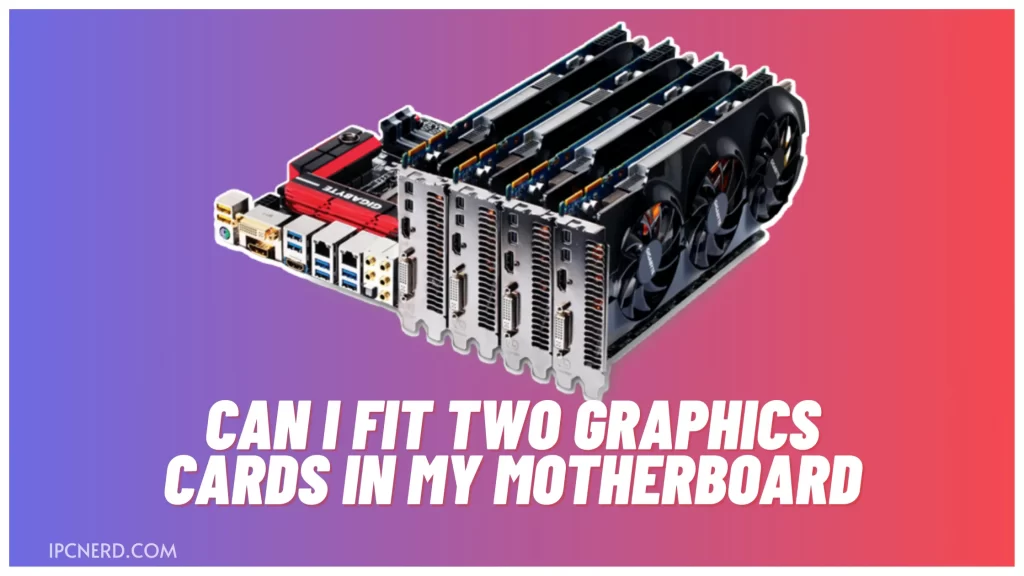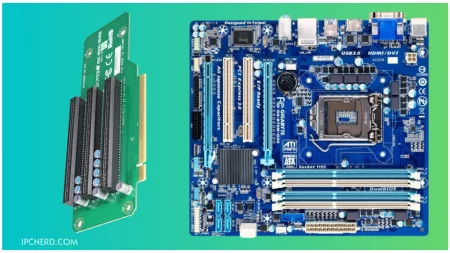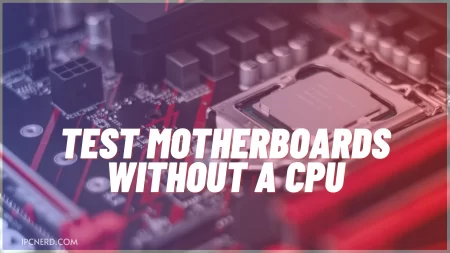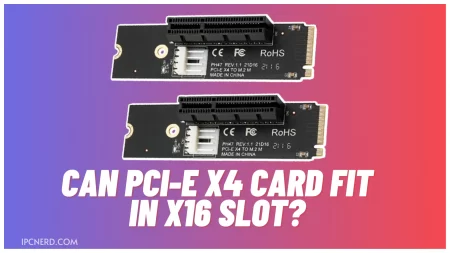If you are considering buying a new graphics card, there are a few things that you might want to consider before purchasing.
This article will answer your questions about whether or not it is possible to fit two cards in your motherboard, what the consequences would be of doing so, and how to purchase the right graphics card for your needs.
- Can I fit more than 2 Graphics Cards in my motherboard?
- How to Check If Your Motherboard Can Fit Two Graphics Cards In It
- The Best Motherboards for a Dual Graphics Card Setup
- What are the Certain Requirements To Install A Graphics Card
- What are the limitations of two graphics cards?
- Should I upgrade to two graphics cards?
- How to check if your motherboard can fit two graphics cards
- Benefits of using two graphics cards
- Frequently Asked Questions
- Conclusion
Can I fit more than 2 Graphics Cards in my motherboard?

If you want to install more than two graphics cards in your motherboard, not all are designed to accommodate more than two graphics cards.
Some processors and motherboards only support a single graphics card. Additionally, some gaming laptops may only have one PCIe slot to support a second graphics card.
If you’re unsure whether or not your motherboard can support more than two graphics cards, consult the manufacturer’s website or contact customer service for help.
Once you know which PCIe slot on your motherboard can support a second graphics card, you can find the appropriate card on retailers’ websites.
How to Check If Your Motherboard Can Fit Two Graphics Cards In It
If you wonder if your motherboard can fit two graphics cards, the answer is usually yes. While a few motherboards might not have enough room for two graphics cards, most boards should be able to accommodate at least one of the graphics cards installed in the correct slots.
Most motherboards have PCIe slots that can fit two graphics cards, and some even have three or four PCIe slots that can fit multiple graphics cards.
It is important to note that some motherboards might not be compatible with dual-GPU setups due to how the PCI-E connectors are configured on the card.
If you plan on using two graphics cards on your motherboard, it is best to check with your motherboard manufacturer about compatibility before making a purchase.
The Best Motherboards for a Dual Graphics Card Setup
Many different motherboards on the market can fit two graphics cards. The more popular ones include the ASRock Z270M-ITX/ac, MSI Z270M Gaming Pro Carbon, and ASUS ROG Strix Z270F Gaming motherboard.
Some of the benefits of using a motherboard with two graphics cards installed are that you will be able to run higher resolutions and framerates than if you were using a single card.
Additionally, dual graphics card setups offer greater flexibility regarding system builds, as you can assemble your configuration.
What are the Certain Requirements To Install A Graphics Card
Graphics cards are one of the most important components of a gaming computer. They are responsible for rendering graphics on the screen and playing games. If you’re looking to build a powerful gaming rig, you’ll need to ensure that you have the right graphics card.
To install a graphics card, you’ll need to meet certain requirements. First, your computer must have a compatible motherboard. Many motherboards support multiple graphics cards, but not all do.
Second, your graphics card must have a compatible connector. Most modern graphics cards use an x16 or x16-based connector. Finally, your computer must have enough power to run the new graphics card.
If you’re unsure whether or not your computer meets the requirements, check with your manufacturer or an online retailer before making any purchases.
What are the limitations of two graphics cards?
Graphics cards are important components of a gaming PC. They help the system render graphics and video, making it possible to enjoy games at their highest graphical fidelity. However, there are some limitations to using two graphics cards in a motherboard.
The first limitation is power. Even if the motherboard supports two graphics cards, each card will require its power supply. If you have a powerful enough PSU, you can install both cards in a dual-slot configuration, but that’s not always feasible or practical.
The second limitation is heated. Multiple graphics cards can generate significant heat when installed near one another.
This increases the chances of thermal throttling (a phenomenon in which the computer’s performance decreases due to overheating) and can damage the hardware if temperatures become too high.
If you’re considering installing two graphics cards on your computer, check the layout and plan for adequate cooling beforehand.
Should I upgrade to two graphics cards?
A graphics card is a specialized motherboard component that helps to accelerate the performance of your computer’s graphics processing unit (GPU).
Most computers come with one or more graphics cards, typically placed in the PCI-E slot on the motherboard. Upgrading your graphics card can greatly improve your gaming experience and allow you to play newer and more demanding games.
Before upgrading, check if your current graphics card will fit in your new motherboard. Many motherboards now require two Graphics Cards of the same type (e.g., Two Nvidia GeForce GTX 1050/1060/1070 cards).
Also, certain features on newer motherboards may only be compatible with dual Graphics Cards. For example, Dual AMD Radeon RX 480 8GB Graphics Cards are required for AMD CrossfireX support on some motherboards.
Overall, upgrading to two Graphics Cards is a great way to improve your gaming experience and expand your capabilities. Make sure your new hardware will work together before you buy it!
How to check if your motherboard can fit two graphics cards
If you’re looking to add a second graphics card to your computer, you’ll first need to check whether or not your motherboard can accommodate the extra hardware. Most motherboards are designed to hold one graphics card, but a few have been updated to support two cards.
First, measure the length and width of your current graphics card to determine if your motherboard is compatible.
Make sure to include the length of any brackets or connectors that may be attached. Then, find the measurements for the second graphics card and compare them to see if they fit. If they don’t, you’ll need to purchase a new motherboard or find an alternate solution.
Most motherboards that can support two graphics cards include additional slots on the back or side of the computer. If yours doesn’t include such slots, you may be able to use an expansion card or a bracket to help hold the extra card in place.
Ensure both cards are properly installed before turning on your computer; mismatched cards can cause problems with your system’s performance.
Benefits of using two graphics cards
Graphics cards are essential for gamers, professionals, and everyday users. They allow you to enjoy games and other multimedia applications to their fullest potential. However, not all motherboards have space for two graphics cards. Here are some benefits of using two graphics cards:
1. Better Graphics Performance: Having two graphics cards allows you to easily power through complex scenes and gameplay. More cores and faster memory will result in better graphics performance, whether playing a game or watching a movie.
2. Increased Gaming Efficiency: When many cores work together, they can improve your gaming efficiency by removing one core’s burden. This can give you a leg up on your opponents and make sure you stay in the game longer.
3. Enhanced Multimedia Experience: Multiple graphics cards also enhance multimedia experiences. Multiple video or audio streams can be played simultaneously with more than one card working together without lag or interruption.
This makes it easier to multitask while watching a movie or playing a game on your computer.
4. Increased Durability: Using two graphic cards is also beneficial for durability reasons. More powerful cards draw more power from your system, protecting it from damage if something falls onto the computer or is knocked over accidentally。
Get more idea of using two graphic cards on the same PC.
Frequently Asked Questions
What’s the best way to fit two graphics cards in a motherboard?
There are a few ways to fit two graphics cards in a motherboard. One is to use a PCIe expansion card; an external card plugs into the motherboard and has extra slots for graphics cards. Another is an SLI or CrossFire connector that allows you to install two graphics cards on one PCIe slot. The last option is to use a bracket or extension card, which attaches between the graphics card and the motherboard
How do I uninstall an existing graphics card?
To uninstall an existing graphics card, remove the PCIe expansion card, SLI, or CrossFire connector if you use one. Then remove the graphics card from the computer.
Can I use multiple graphics cards on my computer?
Yes, you can install multiple graphics cards on your computer. However, you may experience performance issues if you do so. You should only install two graphics cards if you use one of the methods described above to fit them in the motherboard.
Conclusion
There is no definitive answer to this question, as it depends on your motherboard and graphics card. However, it is usually possible to fit two graphics cards in a motherboard if they are similar and have enough space.
If you are unsure whether or not your graphics card will fit in your motherboard, it is best to consult an expert before making any purchases or modifications.







